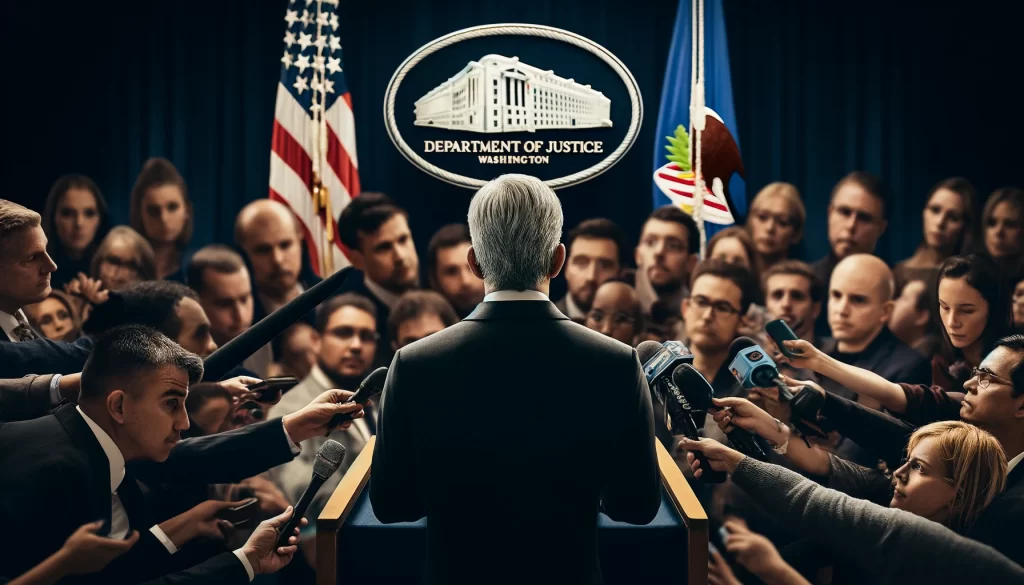In early 2022, the world watched in shock as the Kremlin launched a full-scale invasion of Ukraine, sparking widespread condemnation and raising urgent questions about accountability for war crimes. In the United States, Attorney General Merrick Garland and the Department of Justice swiftly moved to the forefront of international efforts to respond to these events. Through a series of public statements, including during an unexpected visit to Ukraine, Garland voiced strong condemnation of Russia’s military actions and the apparent war crimes that had shocked the global community. He made clear the U.S. commitment to holding those responsible accountable, signaling a significant moment in the international legal landscape.
Garland’s response was not merely rhetorical. Recognizing the gravity of the situation, he promptly established a special team within the Department of Justice dedicated to investigating possible atrocities committed by Russian forces in Ukraine. This initiative bore fruit with the announcement of charges against four Russian soldiers, marking a tangible step towards justice. Additionally, the U.S. has offered support to Ukrainian authorities in their own investigations, underscoring a collaborative approach to addressing these grave concerns.
The Department of Justice’s public and proactive stance on the Ukraine conflict represents a notable shift in its engagement with war crimes, reflecting both a moral and strategic realignment. According to experts like Leila Sadat, a professor of international criminal law and a former adviser to the International Criminal Court, the U.S.’s actions signify a newfound political will and dedication to pursuing justice for war crimes. This change, driven in part by the U.S.’s alignment with Ukrainian interests, has been facilitated by increased resources and expertise within the Justice Department.
However, the situation presents a stark contrast when considering the Department’s response to the conflict between Israel and Hamas, which also involves serious allegations of war crimes. Unlike the immediate and vocal reaction to the events in Ukraine, Garland’s comments on the Israel-Hamas conflict have been notably sparse, limited to a brief mention in response to a journalist’s inquiry. This discrepancy raises important questions about the consistency and factors influencing the U.S. government’s approach to international law and justice.

The legal framework for prosecuting war crimes by the U.S. is established by the War Crimes Act of 1996, which allows for jurisdiction over such crimes when the victim or perpetrator is a U.S. national or resident. The Act was further strengthened by recent legislation that expanded the Justice Department’s authority to prosecute suspected war criminals found on U.S. soil, regardless of their nationality. These developments, welcomed by Garland, underscore the U.S.’s commitment to ensuring there are no safe havens for war criminals.
Given this legal framework, experts argue there are clear grounds for the U.S. to investigate and potentially prosecute Hamas for its actions against Israel, including the killing and kidnapping of civilians and the destruction of civilian infrastructure. Such acts fall squarely within the purview of war crimes, offering a legal and political pathway for U.S. action.
The case for investigating Israel’s military actions in Gaza, however, is more complex. Allegations of excessive civilian casualties and destruction raise serious concerns that could warrant scrutiny under international law. Yet, any move to investigate Israel would likely encounter significant political and diplomatic hurdles, reflecting the delicate balance of interests and alliances that influence decisions in the realm of international justice.
The U.S. has rarely utilized its war crimes statute, with the recent charges against Russian soldiers in Ukraine marking a significant application of this law. The involvement of U.S. citizens, whether as victims or perpetrators, could influence the Justice Department’s willingness to pursue cases, highlighting the challenges of navigating legal, political, and ethical considerations in the pursuit of accountability for war crimes.
This article is based on the following article:

Background Information
By understanding these foundational concepts and the context of the conflicts in question, readers can better appreciate the complexities and significance of the U.S. Department of Justice’s actions as described in the article. This background knowledge helps illuminate the challenges and importance of upholding international law and accountability in the face of war crimes and human rights violations.
1. War Crimes: Definition and Examples
War crimes are serious violations of the laws and customs that apply in armed conflict, as defined by international law. They include a wide range of offenses, such as intentionally killing civilians, torturing prisoners of war, taking hostages, and intentionally attacking civilian buildings like schools and hospitals that are not military targets. Understanding what constitutes a war crime is crucial for grasping the accusations and legal actions discussed in the article.
2. The Conflicts in Ukraine and Between Israel and Hamas
- Invasion of Ukraine by Russia: In February 2022, Russia launched a full-scale invasion of Ukraine, escalating a conflict that began in 2014. This military action led to widespread international condemnation, with numerous reports of atrocities and potential war crimes committed by Russian forces.
- Israel-Hamas Conflict: This conflict refers to the ongoing and historically rooted violence between the State of Israel and the Palestinian organization Hamas, which controls the Gaza Strip. Periods of escalated conflict, such as the one mentioned, often involve military actions by both sides, leading to civilian casualties and potential war crimes.
3. International Law and War Crimes Prosecution
International law, particularly through the Geneva Conventions and the establishment of the International Criminal Court (ICC), provides the framework for the prosecution of war crimes. These international legal instruments aim to hold individuals accountable for violations, promote justice, and deter future atrocities. However, the enforcement of these laws often depends on the political will and cooperation of individual nations.
4. U.S. Legal Framework for Prosecuting War Crimes
The United States addresses war crimes through the War Crimes Act of 1996, which allows the U.S. to prosecute war crimes committed by or against U.S. nationals or residents. Additionally, recent legislation has expanded the ability of the U.S. Justice Department to prosecute war criminals found on U.S. soil, regardless of their nationality or the location of their crimes. This framework reflects the U.S.’s commitment to holding war criminals accountable and ensuring that the U.S. does not become a safe haven for such individuals.
5. The Role of the U.S. Department of Justice
The Department of Justice (DOJ) is responsible for enforcing the laws of the United States, including those related to war crimes. Under the leadership of the Attorney General, the DOJ takes action to investigate and prosecute individuals accused of committing war crimes, as demonstrated in the article’s examples involving Ukraine and the Israel-Hamas conflict.
6. Political and Ethical Considerations
The decision to investigate and prosecute war crimes involves not only legal judgments but also political and ethical considerations. Factors such as international relations, the strategic interests of the U.S., and the broader implications for global justice and human rights play significant roles in these decisions.

Debate/Essay Questions
- Is it effective or ethical for the U.S. to use its national laws, like the War Crimes Act of 1996, to prosecute individuals for crimes committed in foreign conflicts?
- Can the pursuit of war crimes prosecutions by countries like the U.S. genuinely contribute to deterring future war crimes, or does it risk being seen as politically motivated?
- Should the U.S. Justice Department make a greater effort to investigate and potentially prosecute war crimes committed by allies, such as Israel, to demonstrate its commitment to impartial justice?
Please subscribe to Insight Fortnight, our biweekly newsletter!
